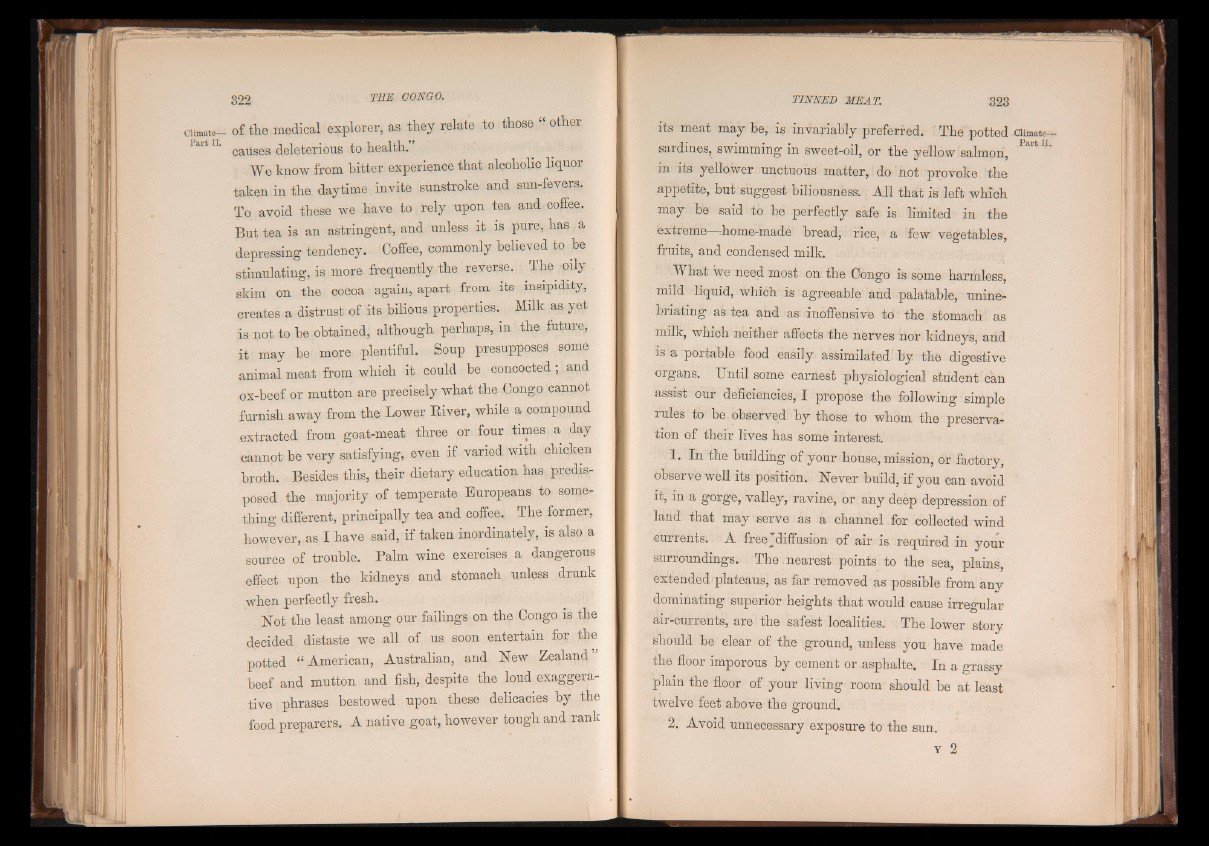
of the medical explorer, as they relate to th o s e o th e r
causes deleterious to health.”
We know from hitter experience that alcoholic liquor
taken in the daytime invite sunstroke and sun-fevers.
To avoid these we have to rely upon tea and coffee.
But tea is an astringent, and unless it is pure, has a
depressing tendency. Coffee, commonly believed to be
stimulating, is more frequently the reverse. p f r oily
skim on the cocoa again, apart from its insipidity,
creates a distrust of its bilious properties: Milk as yet
is not to he obtained, although perhaps, in the future*
it may he more plentiful. Soup presupposes some
animal meat from which it could he concocted; and
ox-beef or mutton are precisely what the Congo cannot
furnish away from the Lower River, while a compound
extracted from goat-meat three or four times a day
cannot he very satisfying, even if varied with chicken
broth. Besides this, their dietary education has predisposed
the majority of temperate Europeans to . something
different, principally tea and coffee. The former,
however, as I have said, if taken inordinately, is also a
source of trouble. Palm wine exercises a dangerous
effect upon the kidneys and stomach unless drunk
when perfectly fresh.
Mot the least among our failings on the Congo is the
decided distaste we all of us soon entertain for the
potted “ American, Australian, and Mew Zealand ’
beef and mutton and fish, despite the loud exaggerative
phrases bestowed upon these delicacies by the
food preparers. A native goat, however tough and rank
its meat may be, is invariably preferred. The potted climate—
i • • • • • P a r t II sardines, swimming m sweet-oil, or the yellow salmon,
in its yellower unctuous’ matter, do not provoke the
appetite, but suggest biliousness. All that is left which
may be said to be perfectly safe is limited in the
extreme home-made, bread, rice, a few vegetables,
fruits, and condensed milk.
What we need most on the Congo is some harmless,
mild liquid, which is agreeable and palatable, unine-
briating as tea and as inoffensive to the stomach as
milk, which neither affects the nerves nor kidneys, and
is a portable food easily assimilated by the digestive
organs. Until some earnest physiological student can
assist our deficiencies, I propose the following simple
rules to be observed by those to whom the preservation
of their lives has some interest.
1. In the building of your house, mission, or factory,
observe well its position. Mever build, if you can avoid
it, in a gorge, valley, ravine, or any deep depression of
land that may serve as a channel for collected wind
currents. A free^diffusion of air is required in your
surroundings. The . nearest points to the sea, plains,
extended plateaus, as far removed as possible from any
dominating superior heights that would cause irregular
air-currents, are the safest localities. The lower story
should be clear of the ground, unless you have made
the floor imporous by cement or asphalte. In a grassy
plain the floor of your living room should be at least
twelve feet above the ground.
2. Avoid unnecessary exposure to the sun.
v 2